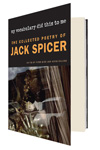This is the collected scar tissue of Jack Spicer, traces of what his vocabulary did, and continues to do, to writers fool enough to become poets. Himself included.
You won’t find any easy platitudes here, no sigh-inducing aphorisms to be showcased on public transportation—the book is a heartbreaker, and not just because its author died young and drunk in the poverty ward of San Francisco General Hospital.
Spicer championed poetry as the alpha and omega of human existence—a kind of kabalistic code capable of generating great power. At the same time, Spicer brushed poetry aside as a fool’s errand. “No one listens to poetry,” he wrote in his 1962 poem “Language,” and while that fact no doubt wounded him, he didn’t write the line as a lament. For Spicer, the poet’s job was not to cultivate a wide audience but to create a world. And like any good metaphysician, he knew the real of the world went beyond the currency of the everyday.
“Words are what sticks to the real,” he wrote in After Lorca. “We use them to push the real, to drag the real into the poem. They are what we hold on with, nothing else.”
William S. Burroughs said that language was a virus from outer space, and Spicer would surely have agreed. Trained as a linguist and immersed in the occult, Spicer saw language— especially the language of poetry—as a transmission from outside. Words stuck to the real, and the real zapped in from another world. He railed against what he called the “big lie of the personal” in poetry. The power—and the point—lay outside most people’s comprehension, often including the poet’s. According to Spicer, the poet must surrender his or her will to communicate in order to become a vessel for the muse. Or, as he liked to say, the Martians. Not a bad philosophy for a disagreeable man dedicated to an esoteric practice. If you’re going to be obscure, he said, you might as well be a “free fucking agent” unbeholden to fame or academia.
A fiercely local and iconoclastic writer— Spicer refused to have his work copyrighted, or, after 1960, published outside of what he called the Pacific Republic of California—he died at forty, having ruptured his liver and lapsed into an alcoholic coma, to no one’s real surprise. He had recently given a series of lectures in Vancouver in which he articulated his idea that true poetry was dictated by outside forces—the Martians—and he was drunk and drunker in his last few months after losing yet another job. In the poverty ward, Spicer became momentarily lucid. He told his fellow poet and friend Robin Blaser, “My vocabulary did this to...
You have reached your article limit
Sign up for a digital subscription and continue reading all new issues, plus our entire archives, for just $1.50/month.
Already a subscriber? Sign in





